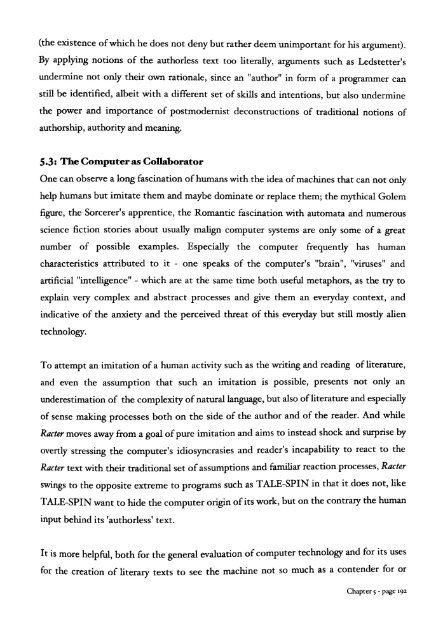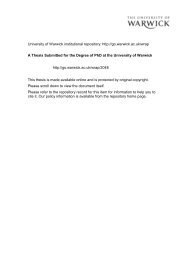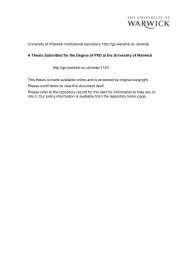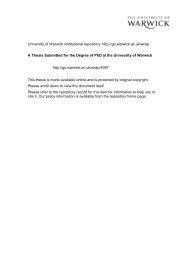From Page to Screen - WRAP: Warwick Research Archive Portal ...
From Page to Screen - WRAP: Warwick Research Archive Portal ...
From Page to Screen - WRAP: Warwick Research Archive Portal ...
You also want an ePaper? Increase the reach of your titles
YUMPU automatically turns print PDFs into web optimized ePapers that Google loves.
(the existence ofwhich he does not deny but rather deem unimportant for his argument).<br />
By applying notions of the authorless text <strong>to</strong>o literally, arguments such as Ledstetter's<br />
undermine not only their own rationale, since an "author" in form of a programmer can<br />
still be identified, albeit with a different set of skills and intentions, but also undermine<br />
the power and importance of postmodemist deconstructions of traditional notions of<br />
authorship, authority and meaning.<br />
5.3: The Computeras Collabora<strong>to</strong>r<br />
One can observe a long fascination ofhumans with the idea ofmachines that can not only<br />
help humans but imitate them and maybe dominate or replace them; the mythical Golem<br />
figure, the Sorcerer's apprentice, the Romantic fascination with au<strong>to</strong>mata and numerous<br />
science fiction s<strong>to</strong>ries about usually malign computer systems are only some of a great<br />
number of possible examples. Especially the computer frequently has human<br />
characteristics attributed <strong>to</strong> it - one speaks of the computer's "brain", "viruses" and<br />
artificial "intelligence" - which are at the same time both useful metaphors, as the try <strong>to</strong><br />
explain very complex and abstract processes and give them an everyday context, and<br />
indicative of the anxiety and the perceived threat of this everyday but still mostly alien<br />
technology.<br />
To attempt an imitation ofa human activity such as the writing and reading ofliterature,<br />
and even the assumption that such an imitation is possible, presents not only an<br />
underestimation of the complexity ofnatural language, but also ofliterature and especially<br />
of sense making processes both on the side of the author and of the reader. And while<br />
Racter moves away from a goal ofpure imitation and aims <strong>to</strong> instead shock and surprise by<br />
overtly stressing the computer's idiosyncrasies and reader's incapability <strong>to</strong> react <strong>to</strong> the<br />
Racter text with their traditional set ofassumptions and familiar reaction processes, Racter<br />
swings <strong>to</strong> the opposite extreme <strong>to</strong> programs such as TALE-SPIN in that it does not, like<br />
TALE-SPIN want <strong>to</strong> hide the computer origin ofits work, but on the contrary the human<br />
input behind its 'authorless' text.<br />
It is more helpful, both for the general evaluation ofcomputer technology and for its uses<br />
for the creation of literary texts <strong>to</strong> see the machine not so much as a contender for or<br />
Chapter 5 - page 192





